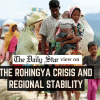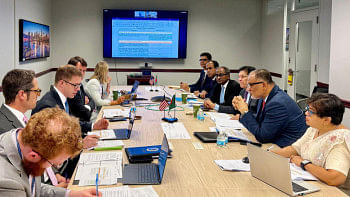Prevent premature repatriation of Rohingyas: Fortify Rights
Fortify Rights has urged Myanmar and Bangladesh to ensure the repatriation of Rohingya refugees through a voluntary, safe, and dignified process and only when Myanmar authorities have restored the rights of Rohingyas.
Fortify Rights, a human rights organisation in Southeast Asia and registered in Switzerland and the United States, today released a new film titled "No Man's Land" that focuses on the plan to repatriate Rohingya to Myanmar.
The film is based on interviews with dozens of newly arrived Rohingya refugees and others in Bangladesh, including a Rohingya boat owner who transports refugees from Myanmar to Bangladesh for a living, and an ethnic-Rakhine Buddhist monk in Bangladesh who preaches inter-ethnic peace.
The film highlights concerns with the plans to repatriate the Rohingyas back to Myanmar.
"You can throw us into the sea, but please don't send us back," said a Rohingya refugee woman in Bangladesh who fled recent Myanmar military-led atrocities in Rakhine State's Buthidaung Township. "We will not go back to Myanmar."
A Rohingya refugee girl, 16, from Buthidaung Township, waited in desperation on the banks of the Naf River for one month before she and her family were able to cross to Bangladesh on November 11, 2017. "If we were willing to go back to Myanmar," she told Fortify Rights, "we would not have stayed at the border for one month."
The repatriation is set to begin tomorrow, January 23, according to an agreement between the governments of Bangladesh and Myanmar made in November last year, later clarifying it would take place during the next two years.
The governments, however, did not consult the Rohingyas or the United Nations High Commissioner for Refugees about the plan.
In the film, none of the recently arrived Rohingyas in Bangladesh told Fortify Rights that they were interested to return to Myanmar under the current conditions.
"The Myanmar Army is committing genocide against an ethnic group in their country," said Prajnananda Bhikkhu, an ethic-Rakhine Buddhist monk in Cox's Bazar, Bangladesh. "This isn't right. It's unjust and inhumane. It must be stopped."
In November 2017, Fortify Rights and the United States Holocaust Memorial Museum published the findings of a yearlong investigation into alleged violations in Rakhine State, finding "mounting evidence" of the crime of genocide.
The report was based on hundreds of interviews with Rohingya eyewitnesses and survivors of Myanmar army-led massacres, mass gang-rapes, and arson attacks against them.
"Any repatriation now would be premature and dangerous," said Matthew Smith, chief executive officer at Fortify Rights. "Repatriation should be safe, truly voluntary, and dignified, but the current situation fails to come close to this standard."
Also, the rights body claimed the Myanmar government continues to confine more than 120,000 internally displaced Rohingyas to more than 35 internment camps in eight townships of Rakhine state, depriving many of adequate humanitarian aid and lifesaving assistance.
Rohingyas in Myanmar were denied equal access to citizenship and faced restrictions on their right to freedom of movement and other basic rights, according to previous reports.
The rights body warned that conditions for potential returnees would likely be no different following repatriation.
The Myanmar government is planning to house returnees in "transit camps" rather than allowing them to return to their original places, it said, adding that the government also further refused to cooperate with a United Nations fact-finding mission, established in March 2017 to look into the situation of human rights in Rakhine state and elsewhere in the country.
"There are no indications that Myanmar authorities plan to dismantle existing internment camps, lift restrictions on movement and aid, or provide much-needed protection," said Matthew Smith. "The very idea of repatriations now is a farce. There must be genuine changes for Rohingya in Myanmar before there can be any serious discussions of repatriation."
The United Kingdom's International Development Committee expressed its concern about repatriation following Fortify Rights and other groups' submissions to its inquiry into the Rohingya crisis.
More than 655,500 Rohingyas fled to Bangladesh after a crackdown by the Myanmar army in the northern part of Rakhine state in response to militant attacks on security forces on August 25 last year.
The United Nations described the military operation as ethnic cleansing of the Rohingya, which Myanmar denies.

 For all latest news, follow The Daily Star's Google News channel.
For all latest news, follow The Daily Star's Google News channel. 








Comments